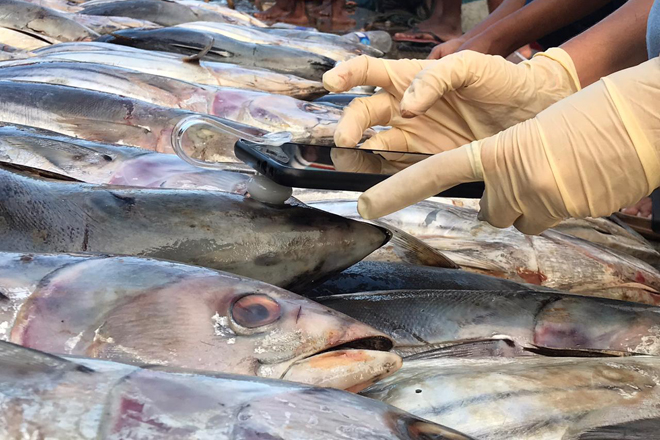The United Nations’ Food & Agriculture Organisation estimates that up to one third of global primary produce is wasted. Minimising food wastage could bring significant benefits to many people around the world. Issues around food freshness and storage are a critical component in this context.
For instance, more than 30% of the fish landed on Sri Lanka’s shores are considered spoilt, according to NARA, Sri Lanka’s National Aquatic Resources Research and Development Agency.
The lack of fishing boat cold storage facilities is compounded by the need to fish further out into the seas as stocks of Indian Ocean tuna dwindle. Consequently, sourcing fresh tuna is a major problem for retailers in Sri Lanka as assessing the quality of tuna is critical.
Assessing tuna is a fine art. It takes about 20 years to train a tuna master who can grade tuna accurately into various grades. Even the best machine vison technologies have thus far found accurate grading a challenge.
Now, GoMicro - an Australian Deep Tech company - has managed to differentiate good tuna from spoilt tuna with a high degree of confidence using Artificial Intelligence.
"Keells has now tested GoMicro AI to assess the quality of Yellowfin Tuna. GoMicro AI can accurately differentiate fresh tuna from tuna that is spoilt. This technology gives us an opportunity to enhance our ability to guarantee the quality of tuna to our customers". Mifrah Ismail, Head of Fresh Food l Vice President - John Keells Group.
After 6 months of development at assessing tuna at the Keells seafood procurement center in Wattala, GoMicro’s patent pending AI assessment technology has finally cracked the problem. It is now able to match the judgement of Keells’ tuna experts in differentiating good tuna from the tuna that is likely to be spoiled by the time it reaches the retail store.
This will not only increase consumer confidence in the quality of tuna sold by Keells, but it will considerably reduce waste. The economic implications are significant in high-value seafood which spoil quickly, partially in countries where logistics and cold storage facilities are not well developed.
GoMicro also carried out experiments with the National Aquatic Resources Research and Development Agency of Sri Lanka to assess if AI can detect the freshness of fish by assessing its eyes - as consumers often do.
GoMicro’s AI engine scored 80% accuracy in assessing the state of the landed skipjack tuna solely by assessing its eyes. GoMicro is also working with a company based at the Sydney Fish Market to grade oysters accurately – which have been previously graded by eye, introducing an element of subjectivity that GoMicro interests to remove.
The accuracy of AI technologies increases over time with increased data and improvements in algorithms. There have been many previous attempts at AI assessment of seafood globally but until now they have not succeeded in achieving the accuracies required for commercial deployment. GoMicro AI has now crossed this line, making it viable for anyone with a phone and GoMicro devices to assess the quality and freshness of the seafood.
The $USD 40 billion global tuna industry is hampered by overfishing and dwindling stock. Technologies such as GoMicro’s AI bring a dynamic driver for improved efficiency in lessening wastage and ensuring sustainability of the sea food sector.

